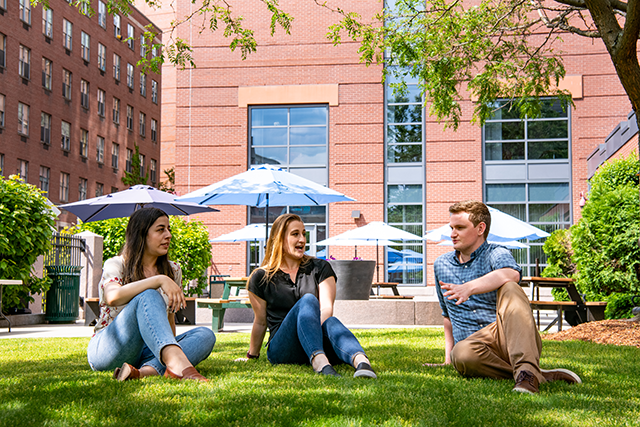Helping MD/PhD Students with Burnout

Medical and graduate school are both known for their rigor, and the challenges that come with it. For the students in Tufts’ combined MD/PhD program, the stressors of the two programs – not to mention moving between them – can compound one another.
“This kind of chronic stress can lead to burnout,” said Michael Chin, MD, PhD the Director of the Tufts Medical Scientist Training Program. “Burnout leads to emotional exhaustion and feelings of inadequacy and can ultimately influence career outcomes.”
In order to combat stress and burnout among MSTP trainees, Dr. Chin – along with the program’s Clinical Director, Gordon Huggins, MD, and Director Emeritus and current Wellness Officer Jim Schwob, MD, PhD – is piloting a series of Wellness and Resilience programming for the 2021/22 Academic Year. This programming is funded by a supplement to the MSTP program’s NIH Training Grant.
“We want to promote wellness for our students,” said Dr. Chin, “but we also want to make sure our trainees are resilient. Programs that focus just on wellness can, in some cases, lead participants to prioritize wellness at the expense of their training. Resilience strategies, on the other hand, acknowledge the adversity inherent in demanding work and environments and provide tools to adapt, which both reduces stress and leads to better training outcomes.”
The supplement will fund a variety of activities designed to promote both wellness and resilience among students in the program, including a series of physician-scientist speakers who will discuss stress and resiliency in MD/PhD training; panels composed of program alumni who will talk about the various stressors inherent in different career paths; and a one-day retreat designed for team building, wellness, and fostering resilience skills. Students will also participate in the NIH OITE’s virtual Becoming a Resilient Scientist series, with discussions facilitated by program leadership.
“Students will have the chance to meet with experienced physician scientists and learn about their personal strategies for wellness,” said Dr. Schwob. “They will be able to get advice about their own struggles and hear from others who have gone through the same things.”
While providing students with resilience training is valuable, the program plans to go further. “Interventions promoting individual resilience are helpful,” said Dr. Chin, “but the benefits are limited. When you focus on reducing organizational barriers to resilience at the same time, however, the benefits increase.”
To that end, the Wellness and Resilience program also contains evaluations designed to identify specific sources of stress among program trainees. “Once we know what those stressors are, we can figure out ways to help students through them,” said Dr. Chin.
One way to help students through their training is by helping mentors learn to recognize burnout and foster resilience in their trainees. To do this, the program will be partnering with Tufts’ Clinical and Translational Science Institute (CTSI) to offer mentorship training. This training will complement culturally aware mentorship training offered to faculty through GSBS and the Center for the Improvement of Mentored Experiences in Research (CIMER).
“Students from underrepresented groups in particular may be under greater stress,” said Dr. Huggins, a member of the CTSI and leader of the mentoring training. “We hope offering these trainings to students and mentors will improve their experience in the program.”
When it comes down to it, the wellness and resilience program is designed to make students’ experiences in the program less stressful, and the way to do that is by making sure student concerns are heard and addressed.
“We want to create a culture of continuous quality improvement, where trainee input is encouraged and that input is used to minimize stress, enhance wellness, and promote resilience,” said Dr. Chin.